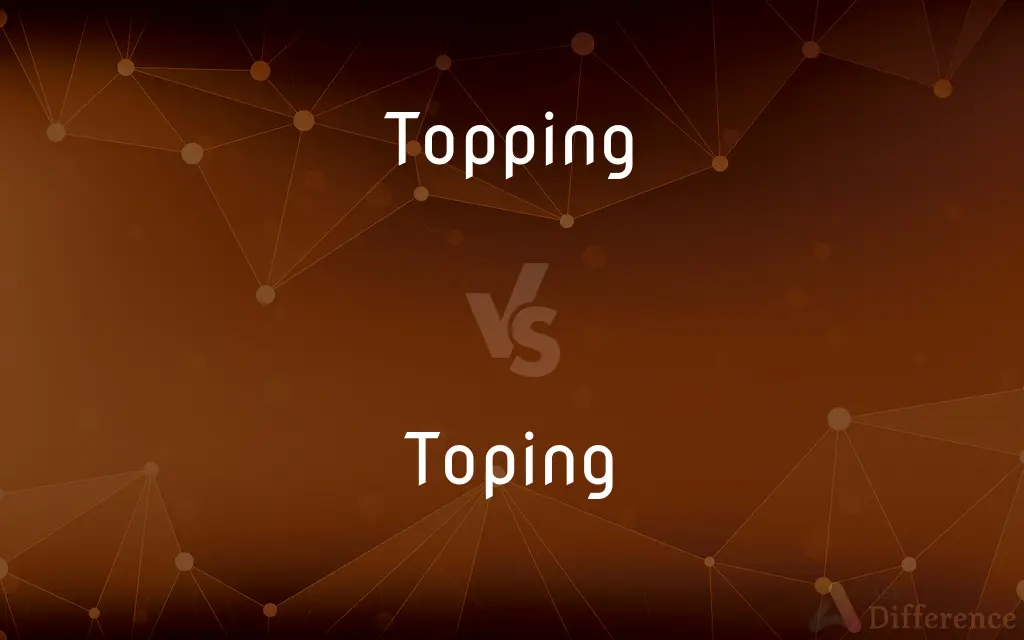Topping vs. Toping — What's the Difference?
By Tayyaba Rehman — Updated on August 21, 2023
Topping refers to an added layer or ingredient on food, whereas toping means drinking alcohol or engaging in excessive drinking.

Difference Between Topping and Toping
Table of Contents
ADVERTISEMENT
Key Differences
Topping, in its most common usage, often refers to an additional layer or ingredient added to food, especially to desserts or pizzas. On the other hand, toping is a lesser-known term that signifies the act of drinking alcohol, more specifically to excess.
Topping can be anything from whipped cream on a hot chocolate to pepperoni on a pizza. It enhances or complements the primary dish. Meanwhile, toping, with a single 'p', relates solely to the consumption of alcoholic beverages.
In the culinary world, toppings can vary widely, from fruits, nuts, sauces, to other delicacies. This makes "topping" a versatile term in the food industry. Toping doesn't have such a broad spectrum of meanings and is specifically tied to the act of drinking.
Grammatically, "topping" can function as a noun (the chocolate topping on the cake) or even as a verb in specific contexts (topping off a drink). On the other hand, "toping" is predominantly used as a verb – to tope or the act of toping.
Topping, due to its association with food, is a more commonly used word in everyday language. Toping, however, is not as commonly used and may not be familiar to many, particularly outside of literary or older contexts.
ADVERTISEMENT
Comparison Chart
Part of Speech
Mainly a noun, sometimes a verb
Predominantly a verb
Primary Meaning
Added layer or ingredient on food
Act of drinking alcohol
Frequency of Use
Commonly used
Less commonly used
Associated Field
Culinary
Alcohol consumption
Derivation
From the verb "to top"
From the verb "to tope"
Compare with Definitions
Topping
An additional layer or ingredient added to food.
I love the strawberry topping on my ice cream.
Toping
The act of drinking alcohol.
He spent his evening toping at the local pub.
Topping
The act of cutting off the top part of plants.
He is topping the trees to promote better growth next season.
Toping
Engaging in excessive drinking.
His habit of toping worried his family.
Topping
An addition to an existing amount.
She gave a topping to her initial investment in the project.
Toping
Consuming alcoholic beverages, especially in large quantities.
Toping every night is harmful to health.
Topping
The act of completing or finishing something.
She is topping off the gas tank before the trip.
Toping
The act of becoming intoxicated by alcohol.
After toping too much, he couldn't find his way home.
Topping
The best or highest part of something.
He was the topping student in his class.
Toping
Reveling or making merry by drinking.
The sailors were toping till the early morning.
Topping
A sauce, frosting, or garnish for food.
Toping
Present participle of tope
Topping
A part or layer that forms the top.
Toping
To drink (liquor) habitually and excessively or engage in such drinking.
Topping
Toppings The cropped parts of plants or trees after pruning.
Topping
Highest in rank or eminence.
Topping
Chiefly British First-rate; excellent.
Topping
Present participle of top
Topping
(archaic) Assuming superiority; proud.
Topping
Any food item added on top of another, such as sprinkles on ice cream or pepperoni on pizza.
Topping
The act of cutting off the top of something.
Topping
(nautical) The act of raising one extremity of a spar higher than the other.
Topping
(nautical) Either of the cables that support the ends of a spar or boom.
Topping
(angling) The tail of an artificial fly.
Topping
Rising above; surpassing.
Topping
Hence, assuming superiority; proud.
The great and flourishing condition of some of the topping sinners of the world.
Topping
Fine; gallant.
Topping
The act of one who tops; the act of cutting off the top.
Topping
The act of raising one extremity of a spar higher than the other.
Topping
That which comes from hemp in the process of hatcheling.
Topping
The tail of an artificial fly.
Topping
Something placed on top of another thing, such as a sauce or garnish on food; as, a three-scoop banana split with three different toppings; an ice-cream cone with chocolate fudge topping.
Topping
A flavorful addition on top of a dish
Topping
Excellent; best possible
Common Curiosities
Is topping always related to food?
While "topping" primarily refers to an extra layer or ingredient on food, it can also mean finishing or completing something.
Which word has more diverse meanings: topping or toping?
"Topping" has more diverse meanings, while "toping" mainly relates to drinking alcohol.
Does toping mean to top something?
No, "toping" refers to the act of drinking alcohol, especially in excess.
Can topping be used as a verb?
Yes, "topping" can be used as a verb, such as in "topping off a drink."
Is toping a common word in everyday English?
No, "toping" is not as commonly used as "topping" and may not be familiar to many.
In which context is topping most frequently used?
"Topping" is most frequently used in a culinary context, referring to additional ingredients on food.
Can toping be a noun?
While "toping" is predominantly a verb, in older or literary contexts, it might be used as a noun to refer to a drinking session or spree.
Are the words topping and toping derived from the same root?
No, "topping" comes from the verb "to top," while "toping" is derived from the verb "to tope."
Can you use topping in the context of plants?
Yes, "topping" can refer to the act of cutting off the top part of plants.
Is toping always negative in context?
Mostly, "toping" denotes excessive drinking, which carries a negative connotation, but it can also simply refer to the act of drinking alcohol.
Share Your Discovery

Previous Comparison
Giggle vs. Chuckle
Next Comparison
Grand vs. GrantAuthor Spotlight
Written by
Tayyaba RehmanTayyaba Rehman is a distinguished writer, currently serving as a primary contributor to askdifference.com. As a researcher in semantics and etymology, Tayyaba's passion for the complexity of languages and their distinctions has found a perfect home on the platform. Tayyaba delves into the intricacies of language, distinguishing between commonly confused words and phrases, thereby providing clarity for readers worldwide.














































